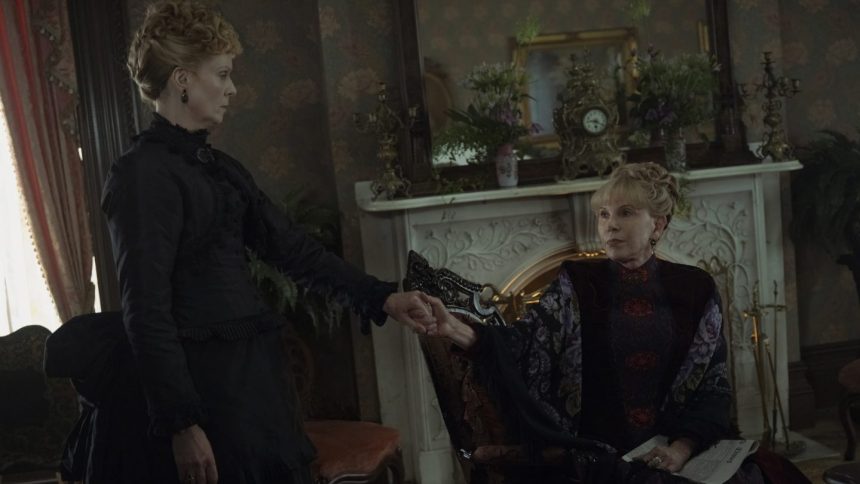‘The Gilded Age’ Returned With a Question That Will Steer All of Season 3
[This story contains spoilers form TheGilded Age season three premiere, “Who Is in Charge Here?”]
A year and a half since its season two finale, HBO’s hit drama The Gilded Age returned on Sunday without missing a beat. Picking up right where it left off, episode one appropriately asked, “Who Is in Charge Here?” Until now, the answer had been an easy one for spectacular sisterly duo Agnes van Rhijn and the former Ada Brook, splendidly portrayed by Christine Baranski and Cynthia Nixon. For much of the series, Agnes, as both the older and wealthier sister, called the shots. That dynamic shifted at the end of last season.
In a ploy to hide his homosexuality, Oscar (Blake Ritson), Agnes’ only child, squandered his mother’s wealth pursuing a marriage with Maud Beaton. Just as the family, which also includes Agnes and Ada’s niece, Marian Brook, was packing up their treasured 61st Street mansion for sale, Ada discovered that her minister husband, Luke Forte (Robert Sean Leonard), whom she buried too briefly after they wed, was not the man of moderate means she presumed. As his widow and sole heir, she became the wealthier sister. But, as the cliché goes, old habits are hard to break for Agnes — and this new reality is at the center of episode one. Prior to the season three premiere, Gilded Age creator Julian Fellowes explained why with a group of invited press.
“I’m always rather fascinated by people who pretend that the loss of money, the loss of position, doesn’t affect them at all, that everything can just go on as it did before. So, of course, it can’t. And even today, we know that. But here we have Agnes, whose belief in the essentially European concept of greatness by birth can’t be shifted. She starts out pseudo-confident that everything will be as normal. But of course, we know it won’t,” explained the Egypt-born Brit.
You Might Also Like
“Gradually during [this third] season, we see Ada gather the confidence that belongs to her, that is her right. And I just wanted to explore that shift, really,” he continued. “The English are very given to believing that the loss of money hasn’t affected anything. Of course, it’s bollocks now, and it was bollocks then. Nevertheless, they deceive themselves more, I think, than the Americans.”
He added that “the Americans are a more realistic nation about how it is now. And that’s really what we’re seeing with these two sisters and the others, Marian and so on, they understand the change that has taken place, but they don’t feel it’s their business to make the change obvious. It[‘s] between the sisters to come to terms with what is different.”
That takes some time, he shared, because “Ada is a compliant person and wants things to be easy and wants things to go along” and “for a time, because of her nature and her generosity, really, she is content for Agnes to pretend that not too much has changed, but of course it has.”
Marriage, as is customary for this genre, plays a big role in the series once again. Last season, Bertha Russell (Carrie Coon) who, as a woman, is forced to channel her ambition into elevating her and her family’s social status, pulled off a major coup in her Opera War face-off with Mrs. Astor (Donna Murphy). Not only did she pack the house in the new Metropolitan Opera House, but Bertha also secured the presence of Hector, the Duke of Buckingham (Ben Lamb), who had promised to attend the competing Academy of Music opening night hosted by Mrs. Astor. Curiosity around how has not ceased in episode one. As Bertha’s daughter Gladys (Taissa Farmiga) nudges closer to marriage, clearly preferring Billy Carlton (Matt Walker), however, Bertha speaks more highly of the Duke and, by the episode’s end, even announces his return to New York.
Bertha’s rebuffs of any conversation of her Gladys marrying Billy sets in motion a larger debate around whether women in this era should marry for love or position. Gladys is convinced otherwise and awaits the return of her father, George, an aspiring titan of industry away from the family trying to manage and grow his empire, to give his blessing to her choice and not her mother’s.
Foreshadowing one of the major conflicts in season three, Coon, who masterfully plays Bertha, offered insight into why the Russell matriarch and patriarch will be at odds over whom Gladys marries. “The woman’s purview is very different. He doesn’t understand our instinct for survival, which is, in this case, through marriage, and that Bertha really believes what she’s doing is an existential question. She wants her daughter to be safe,” she said. “She also wants her to be fulfilled and have a sense of purpose, because I think Bertha knows what it feels to have that capacity thwarted, she wants her daughter, she’s hungry for her daughter, to have a kind of power she didn’t have.”
So next episode, Bertha will go from hinting at Gladys marrying the Duke to ensuring that she does.
In allowing Larry, Bertha’s son who was last entangled with an older widowed woman, to pursue Marian (Louisa Jacobson) romantically, Fellowes and Warfield set up a counter to Bertha’s view of marriage. It’s a perspective Harry Richardson, who plays Larry, cherishes. “I think what’s really special about their relationship is that they have the opportunity to grow as friends first, which I think societally at that time, they didn’t have the space to be able to go out on the town or to get to know each other before they started seeing each other in a romantic light and I think their dynamic’s written very beautifully that they really start with that foundation of friendship and that foundation of care for each before they start contemplating a romance,” says Richardson.
The dissolution of Agnes’ niece-by-marriage Aurora Fane’s (Kelli O’Hara) union, prompted by a divorce request from her husband, Charles (Ward Horton), who wishes to marry his mistress, illustrate what’s at stake for women of this socioeconomic tier. As a divorced woman, she will become a social pariah. Men don’t suffer the same fate. And, as the continuing storyline of van Rhijn/Brook Forte house footman Jack Trotter (Ben Ahlers) and his patented alarm clock that his new business partner Larry hopes to sell, illustrates, men have additional outlets for economic elevation.
Denée Benton’s very popular character Peggy Scott didn’t see much action in episode one. But Peggy’s illness at the end will prove a gateway to an even more robust world as actors Phylicia Rashad, Brian Stokes Mitchell and Jordan Donica help expand her world beyond Audra McDonald and John Douglas Thompson, who play her parents Arthur and Dorothy Scott, and Sullivan Jones, who plays historic Black newspaper publisher T. Thomas Fortune, her boss and inappropriate love interest.
During the discussion, Fellowes’ collaborator Sonja Warfield also noted that episode one’s burning question (and title) of “Who Is in Charge Here?” doesn’t end here. The whole season, she shared, is “about who’s in charge: Who is in charge in society, who’s in charge of marriages, who has the power.”
New episodes of The Gilded Age’s third season premiered June 22 and continue weekly through Aug. 10, streaming on HBO Max.







